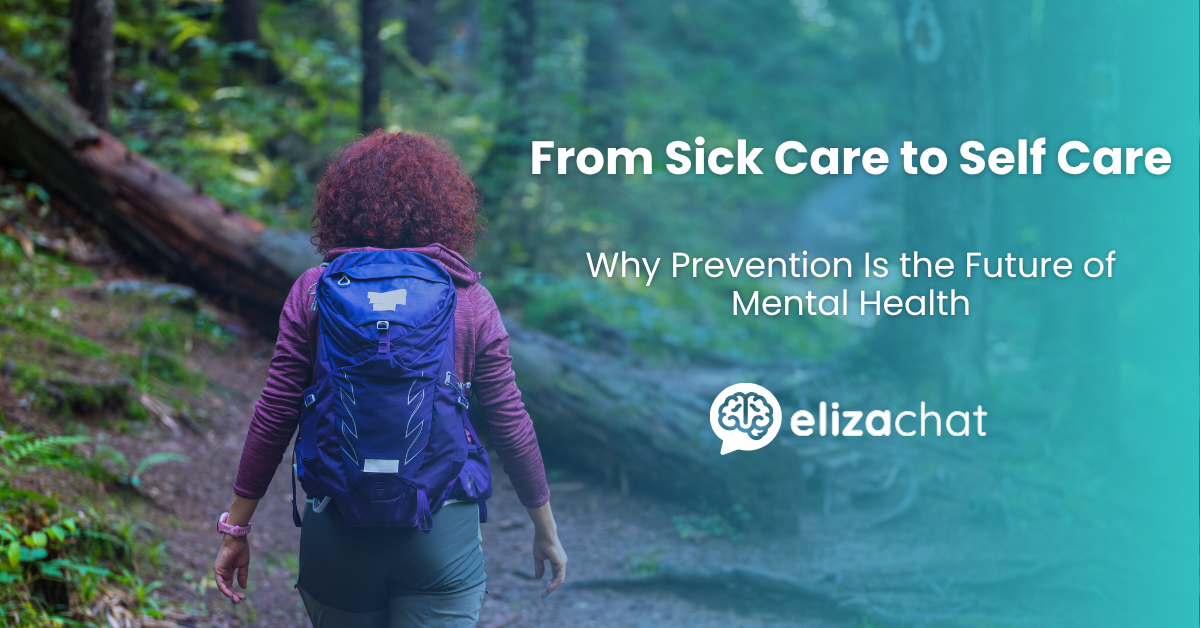Most healthcare systems are designed to respond when something breaks, not to build strength ahead of time. We wait for symptoms, then scramble to treat them. Dr. John Sanders, a family physician and founder of Voyage Clinics, believes it is time to flip that model, especially when it comes to mental health.
In a recent Mental Fitness Podcast episode, Dr. Sanders shares how prevention, emotional intelligence, and simple daily habits can reshape our understanding of wellness. His message is clear: the goal is not to rescue people after they fall, but to build the fence before the cliff.
The Problem with “Sick Care”
Medicine has made remarkable strides in treating disease, but as Dr. Sanders notes, “A lot of our medical institutions are designed to provide care to the super sick.” That reactive model has turned healthcare into what he calls sick care, a system optimized for emergencies rather than prevention.
He compares it to a burning building:
“Instead of asking how to stop the fire, we’ve built an industry around putting it out.”
This same pattern exists in mental health. Schools and communities often intervene only after anxiety, depression, or burnout reach crisis levels. The result is an exhausted system and millions of people who never receive help early enough to prevent escalation.
Preventive care is not just an ideal. It is the missing foundation for sustainable health. And according to Dr. Sanders, the solution starts long before a diagnosis code or insurance claim.
Prevention Begins with Education
If prevention is the goal, education is the pathway. Dr. Sanders believes emotional intelligence should be taught as routinely as math or physical education.
“Let’s teach emotional intelligence the way we teach PE. Physical education is normal, why not mental education?”
The idea is simple but transformative: if we want to prevent mental illness later in life, we need to build emotional awareness in childhood.
At ElizaChat, this same philosophy drives our focus on mental fitness, helping individuals practice reflection, emotional regulation, and resilience before challenges become crises.
The Mind and Body Connection
Dr. Sanders does not separate physical and mental wellness. “There is no bio-only,” he explains. “It’s all biopsychosocial.”
He sees every patient through that lens. Whether someone is struggling with anxiety or diabetes, both body and mind are part of the treatment plan.
His prescription for prevention is surprisingly practical:
- Prioritize Sleep – “Next to air, sleep is the most important thing,” he says. “Go three nights without it and you’re cooked.”
- Limit Screen Time – Smartphones, social media, and streaming platforms hijack dopamine pathways, creating what Dr. Sanders calls a “dopamine bath” that spikes motivation temporarily but lowers baseline drive over time.
- Move Daily – Simple, moderate activity like long walks reduces anxiety, lowers visceral fat, and clears mental fog.
- Eat Real Food – “Eighty percent of the grocery store is junk. Shop the perimeter. Fresh fruits, vegetables, meat, and dairy, that’s it.”
- Spend Time in Nature – “Three days in the wilderness resets everything,” he adds. “No devices, no noise, just quiet.”
These are not new discoveries, they are reminders of what science has shown all along. Mental health is inseparable from physical vitality. Sleep, nutrition, and movement are the foundation of mental fitness.
Time, Trust, and the Human Element
In his direct primary care practice, Dr. Sanders spends up to an hour with each patient. That time, he says, is irreplaceable.
“Trust is magic. With trust comes better outcomes. Without it, we lose thirty percent of the healing potential.”
Traditional systems often reduce appointments to five minutes, a pace that erodes both connection and care. By contrast, deeper relationships lead to better listening, more accurate diagnoses, and genuine healing.
The same is true for mental wellness. Feeling cared for is not placebo, it is neuroscience. Human empathy activates the same brain regions associated with safety and recovery. When patients feel seen and supported, their physiology changes.
At ElizaChat, we design AI support tools with this same principle. Technology should extend human connection, not replace it. Our conversations are built to model empathy, reinforce healthy thinking, and nudge users toward real-world connection and professional help when needed.
Building a Preventive Culture
Prevention is not just about individual habits, it is a cultural shift. Dr. Sanders envisions a world where mental fitness is woven into daily life, where emotional education starts in elementary school and healthcare emphasizes long-term strength over short-term fixes.
He is realistic about the barriers: financial incentives that reward procedures over prevention, and cultural habits that glorify the grind. Yet his optimism stands out. “Why are we waiting for insurance companies to feed this movement?” he asks. “Let’s just do it affordably, transparently, beautifully.”
By removing unnecessary gatekeepers and focusing on direct, human-centered care, prevention becomes possible again.
The Simpler Prescription
When asked to summarize his advice, Dr. Sanders smiled and said it simply:
“Simplify your life. Less screens, less ingredients, more sleep, more connection.”
The best medicine, it turns out, often costs nothing at all, just attention and intention.
The Future of Mental Fitness
Prevention is the next frontier of healthcare. We will never have enough ambulances at the bottom of the cliff. The real progress lies in building fences at the top.
ElizaChat’s mission is to make those fences accessible to everyone. Through daily reflection, guided emotional skills, and clinically informed support, we are helping individuals strengthen their mental fitness one conversation at a time.
Because the future of health is not sick care, it is self care.
.svg)
